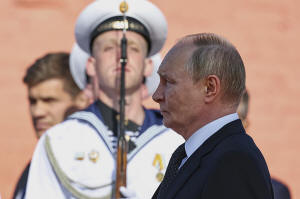Russia says it no longer will abide by its self-imposed moratorium on
intermediate-range missiles
[August 06, 2025]
MOSCOW (AP) — Russia has declared that it no longer considers itself
bound by a self-imposed moratorium on the deployment of nuclear-capable
intermediate range missiles, a warning that potentially sets the stage
for a new arms race as tensions between Moscow and Washington rise again
over Ukraine.
In a statement Monday, the Russian Foreign Ministry linked the decision
to efforts by the U.S. and its allies to develop intermediate range
weapons and preparations for their deployment in Europe and other parts
of the world. It specifically cited U.S. plans to deploy Typhoon and
Dark Eagle missiles in Germany starting next year.
The ministry noted that such actions by the U.S. and its allies create
“destabilizing missile potentials" near Russia, creating a "direct
threat to the security of our country” and carry “significant harmful
consequences for regional and global stability, including a dangerous
escalation of tensions between nuclear powers.”
It didn't say what specific moves the Kremlin might take, but President
Vladimir Putin has previously announced that Moscow was planning to
deploy its new Oreshnik missiles on the territory of its neighbor and
ally Belarus later this year.
Asked where and when Russia could potentially deploy intermediate-range
weapons, Kremlin spokesman Dmitry Peskov said that it's not something to
be announced in advance.
“Russia no longer has any limitations, Russia no longer considers itself
to be constrained by anything,” Peskov told reporters. “Therefore Russia
believes it has the right to take respective steps if necessary.”

“Decisions on specific parameters of response measures will be made by
the leadership of the Russian Federation based on an interdepartmental
analysis of the scale of deployment of American and other Western
land-based intermediate-range missiles, as well as the development of
the overall situation in the area of international security and
strategic stability,” the Foreign Ministry said.
Russia's move follows Trump's nuclear messaging
The Russian statement follows President Donald Trump's announcement
Friday that he’s ordering the repositioning of two U.S. nuclear
submarines “based on the highly provocative statements” of Dmitry
Medvedev, who was president in 2008-12 to allow Putin, bound by term
limits, to later return to the office. Trump's statement came as his
deadline for the Kremlin to reach a peace deal in Ukraine approaches
later this week.
Trump said he was alarmed by Medvedev’s attitude. Medvedev, who serves
as deputy chairman of Russia's Security Council chaired by Putin, has
apparently sought to curry favor with his mentor by making provocative
statements and frequently lobbing nuclear threats. Last week. he
responded to Trump's deadline for Russia to accept a peace deal in
Ukraine or face sanctions by warning him against “playing the ultimatum
game with Russia” and declaring that “each new ultimatum is a threat and
a step toward war.”
[to top of second column]
|

Russian President Vladimir Putin arrives to attend a flag raising
ceremony of the Knyaz Pozharsky nuclear-powered Borei-A class
submarine in Severodvinsk, Russia, Thursday, July 24, 2025.
(Alexander Kazakov, Sputnik, Kremlin Pool Photo via AP)

Medvedev also commented on the Foreign Ministry’s statement,
describing Moscow's withdrawal from the moratorium as “the result of
NATO countries’ anti-Russian policy.”
“This is a new reality all our opponents will have to reckon with,”
he wrote on X. “Expect further steps.”
INF treaty abandoned in 2019
Intermediate-range missiles can fly between 500 to 5,500 kilometers
(310 to 3,400 miles). Such land-based weapons were banned under the
1987 Intermediate-range Nuclear Forces (INF) Treaty.
Trump withdrew from the pact in his first term, citing Russian
violations, which Moscow denied. It, in turn, alleged the U.S. had
committed violations. The treaty was terminated in 2019, but the
Kremlin declared its self-imposed moratorium on their deployment
until the U.S. makes such a move.
The collapse of the INF Treaty has stoked fears of a replay of a
Cold War-era European missile crisis, when the U.S. and the Soviet
Union both deployed intermediate-range missiles on the continent in
the 1980s. Such weapons are seen as particularly destabilizing
because they take less time to reach targets, compared with
intercontinental ballistic missiles, leaving no time for
decision-makers and raising the likelihood of a global nuclear
conflict over a false launch warning.
Russia’s missile forces chief has declared that the new Oreshnik
intermediate range missile, which Russia first used against Ukraine
in November, has a range to reach all of Europe. Oreshnik can carry
conventional or nuclear warheads.
Putin has praised the Oreshnik’s capabilities, saying its multiple
warheads that plunge to a target at speeds up to Mach 10 are immune
to being intercepted and are so powerful that the use of several of
them in one conventional strike could be as devastating as a nuclear
attack.
Putin has warned the West that Moscow could use it against Ukraine’s
NATO allies who allowed Kyiv to use their longer-range missiles to
strike inside Russia.
All contents © copyright 2025 Associated Press. All rights reserved
 |